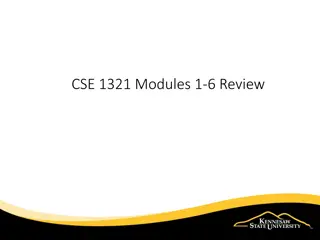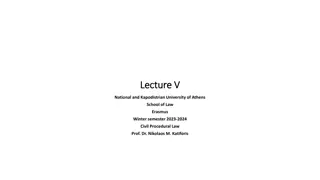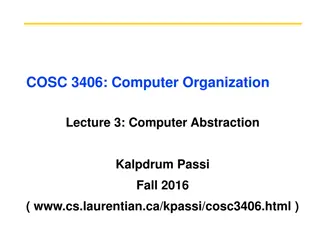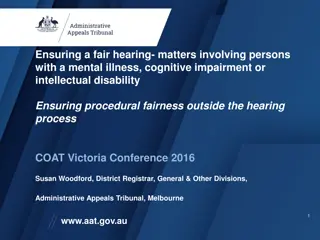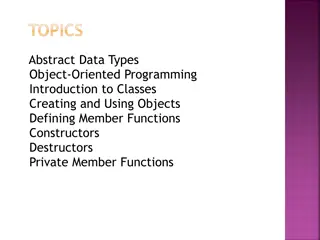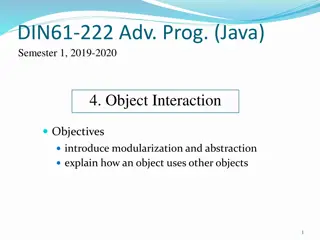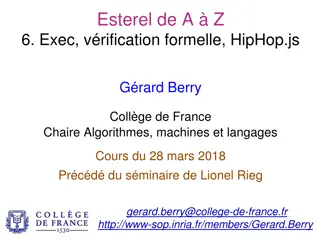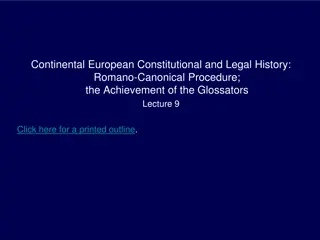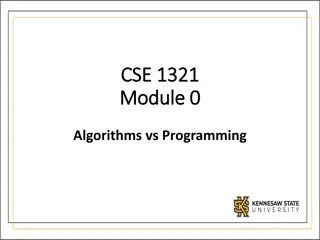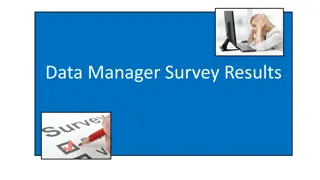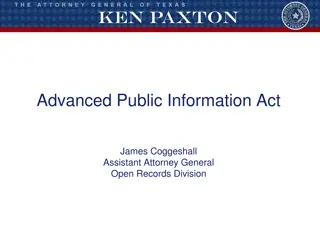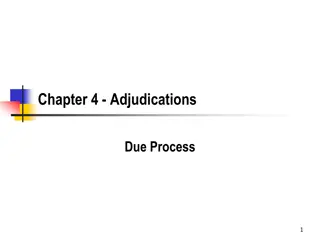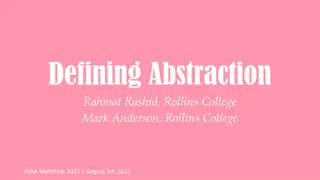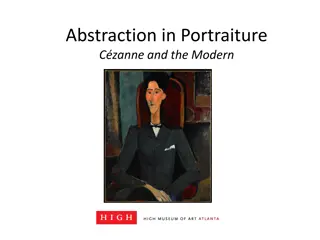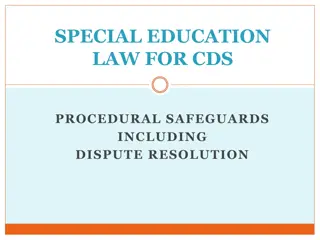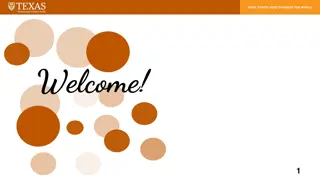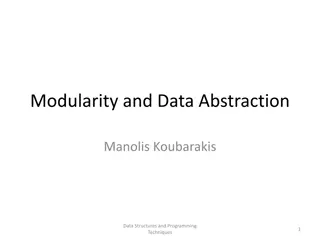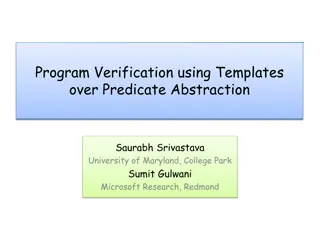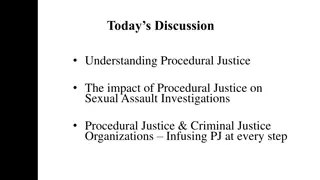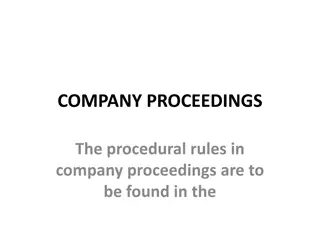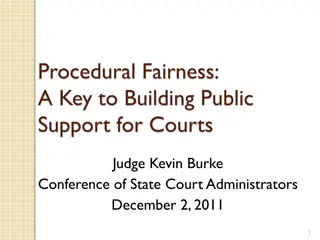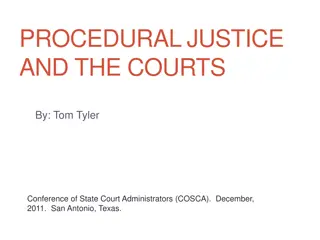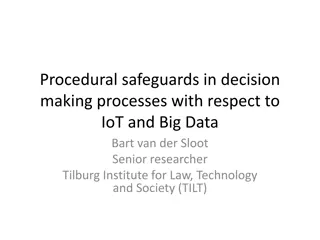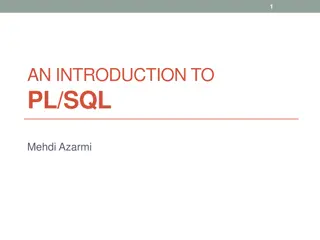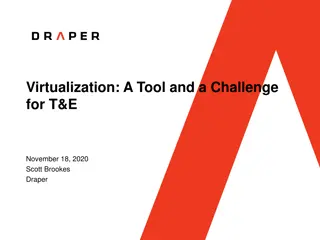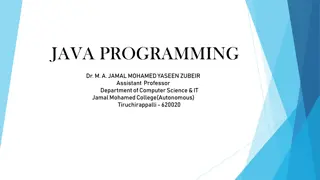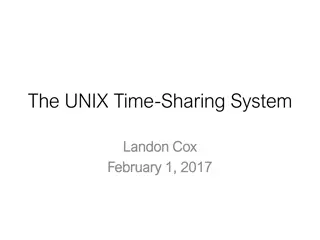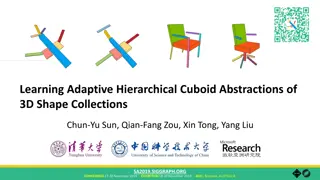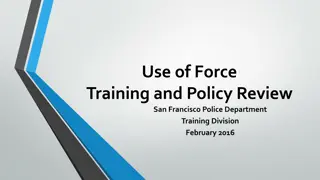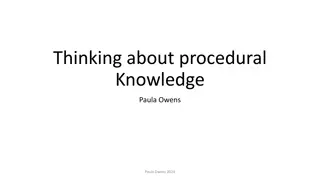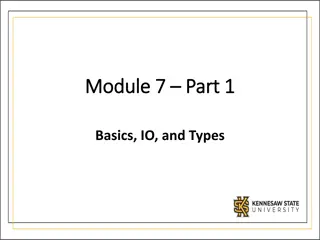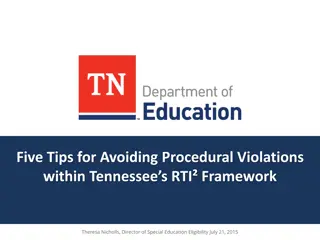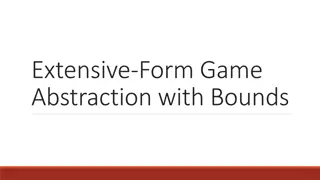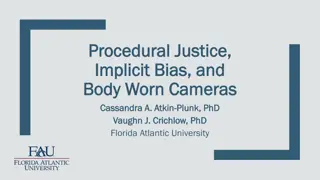Understanding Procedural Safeguards for Students with Disabilities
This information delves into the procedural safeguards for students with disabilities receiving special education services, covering topics such as laws governing procedural safeguards, parents' rights and responsibilities, abbreviation glossary, and the required Notice of Procedural Safeguards unde
1 views • 37 slides
Understanding Algorithms and Programming Fundamentals
Learn about algorithms, programming, and abstraction in computing. Explore the definition and properties of algorithms, the relationship between algorithms and programming, and the concept of abstraction. Discover how algorithms are like recipes and how abstraction simplifies complex tasks in comput
1 views • 17 slides
Network Function Abstraction A delicate question of (CPU) affinity?
Exploring the delicate balance of CPU affinity in network function abstraction, including challenges, benefits, and solutions like CPU pinning for network workloads. Learn about the impact on performance and scalability, as well as the importance of proper configuration in virtual and physical envir
3 views • 40 slides
Understanding Algorithms and Abstraction Concepts in Programming
Exploring algorithms as logical steps to accomplish tasks and abstraction as a way to group concepts for clarity in programming. Dive into flowcharts for sorting algorithms, pseudocode skeletons, and code snippets in various languages like C#, Java, and C++. Learn about handling variables and user i
2 views • 48 slides
Proceedings for Provisional Remedies in Civil Procedural Law
Greek legal theory distinguishes between conservatory and regulatory provisional remedies to secure substantive rights or provisionally arrange disputed situations. These remedies are constitutionally guaranteed and granted under specific substantive and procedural conditions. The procedure involves
0 views • 14 slides
Understanding Computer Abstraction and Performance Metrics
Computer abstraction, instruction count, CPI, and performance metrics like clock cycles, CPU time, and program execution are crucial concepts in computer organization. Through examples and detailed explanations, this lecture explores how architecture, instruction sets, compilers, and algorithms impa
0 views • 27 slides
Ensuring Fair Hearing in Legal Proceedings for Individuals with Disabilities
Susan Woodford discusses the importance of procedural fairness in legal proceedings involving individuals with mental illness, cognitive impairment, or intellectual disability. She emphasizes the need for flexibility in adopting fair procedures tailored to each case, including providing information
0 views • 7 slides
Computational Thinking, Algorithms & Programming Overview
This unit covers key concepts in computational thinking, including decomposition, abstraction, and algorithmic thinking. Decomposition involves breaking down complex problems, abstraction focuses on identifying essential elements, and algorithmic thinking is about defining clear instructions to solv
1 views • 5 slides
Introduction to Object-Oriented Programming and Data Abstraction
Introduction to object-oriented programming concepts including classes, objects, member functions, constructors, destructors, and abstract data types. Exploring the principles of abstraction in software development, passing objects to functions, and understanding the limitations of procedural progra
0 views • 47 slides
Understanding Modularization and Abstraction in Object-Oriented Programming
Modularization in programming involves breaking down complex problems into simpler sub-parts, while abstraction allows combining low-level details into higher levels. By using modules and abstract classes, software development becomes more manageable and efficient, especially in object-oriented prog
0 views • 39 slides
Formal Verification and Automata Abstraction in Esterel
This content delves into the applications of formal verification and automata abstraction in Esterel, focusing on techniques such as verification by abstraction of automata, boolean verification using BDDs, bounded model checking in SAT/SMT, and more. The work of Gérard Berry at the Collège de Fra
0 views • 38 slides
Overview of EPPO and Procedural Rights in EU Law
This material focuses on the European Public Prosecutor's Office (EPPO) and its adherence to procedural rights within the framework of EU law. It covers the provisions of the EPPO Regulation related to procedural rights, including principles of rule of law, impartial investigations, and judicial rev
0 views • 22 slides
Evolution of Procedural Law in Continental European Legal History
The journey of procedural law in Continental European legal history, from the challenges faced by glossators in creating Romano-canonical procedure to the discussions on canonic procedure in canon law. Explore the intricacies of legal procedure development and the influences of historical texts such
0 views • 36 slides
Understanding Algorithms and Programming: A Visual Introduction
Explore the fundamental concepts of algorithms and programming through visual representations and practical examples. Learn about algorithmic thinking, abstraction, recipe-like algorithms, and the importance of logical steps in accomplishing tasks. Discover how algorithms encapsulate data and instru
1 views • 17 slides
Satisfiability Modulo Abstraction for Separation Logic with Linked Lists
This study explores the application of satisfiability modulo abstraction in separation logic with linked lists. It presents a technique using abstract interpretation concepts to handle separation logic formulas beyond previous methods, specifically focusing on over-approximating heaps that satisfy t
0 views • 41 slides
Analysis of Data Manager Survey Results in VQI Abstraction
Survey results gathered from 942 notified Data Manager users in VQI abstraction revealed insights on responsibilities, experience levels, backgrounds, and facility types. Responses indicate varying levels of involvement with data collection, team size, and number of facilities managed, providing val
0 views • 27 slides
Open Records and Requests Process Overview
This presentation provides valuable information on the Advanced Public Information Act, open records letter rulings issued between 2001-2017, withdrawing requests for rulings, requesting previous determinations, and procedural obligations under Section 552.301. It covers reasons for withdrawal, comm
0 views • 35 slides
Exploring Due Process: Substantive and Procedural Dimensions
Dive into the intricacies of substantive and procedural due process, understanding the limits on government regulation and the significance of fair procedures in affecting individual rights. Explore the evolution of due process from historical perspectives to modern interpretations, reflecting on it
1 views • 27 slides
Exploring Abstraction in Mathematics: Insights from MAA MathFest 2022
Delve into the concept of abstraction with a focus on diverse perspectives, historical influences, pedagogical approaches, and the process of abstraction itself as discussed at MAA MathFest 2022. Engage with enlightening comparisons and references shedding light on this fundamental mathematical prin
0 views • 7 slides
Understanding Portraits: Realism, Abstraction, and Representation
Delve into the world of portraiture with a focus on realism and abstraction, exploring how artists like Cézanne, Vermeer, and Picasso depict their subjects. Learn the significance of portraits, the difference between realistic and abstract art, and the impact of color on portraying emotions and pro
0 views • 7 slides
Understanding Special Education Law and Procedural Safeguards for Children with Disabilities
Learn about the procedural safeguards that educational institutions must implement for children with disabilities, including the provision of annual notice, independent evaluations, parental consent, access to records, and dispute resolution options. Discover who these safeguards apply to – parent
0 views • 28 slides
Procedural Decomposition and Static Methods in Programming
Understanding procedural decomposition and static methods is essential in programming to reduce redundancy, organize code effectively, and manage complexity. Procedural decomposition involves dividing a problem into methods, while static methods help in code reuse and managing complexity. By designi
0 views • 18 slides
Understanding Modularity and Data Abstraction in Programming
Learn about the importance of procedural abstraction, information hiding, modules, and abstract datatypes in programming. Discover how these concepts help in structuring large programs, improving maintainability, and enhancing data organization and operation control.
0 views • 56 slides
Program Verification Using Templates Over Predicate Abstraction
This research explores a technique that allows for inferring invariants with arbitrary quantification and boolean structure, improving the state-of-the-art in program verification. It can infer weakest preconditions, helping with debugging and analysis by discovering worst-case inputs and missing pr
0 views • 32 slides
Understanding Procedural Justice and Its Impact on Criminal Justice Organizations
Procedural justice emphasizes fairness, respect, and transparency in decision-making processes. This approach can lead to positive organizational changes, improved community relationships, and increased trust and legitimacy. The four pillars of procedural justice include fairness in rule application
0 views • 12 slides
Understanding Procedural Rules in Company Proceedings
Procedural rules governing company proceedings can be found in the Companies Proceeding Rules, Companies Winding-Up Rules, and the Federal High Court (Civil Procedure) Rules. These rules dictate the process for applications, such as Originating Summons, Originating Motion, or Petition under CAMA. Th
0 views • 22 slides
Understanding Public Perceptions of Courts and Judges
Exploring public opinions on procedural fairness in courts, this content discusses the influence of judges' political views, aspirations for higher courts on their impartiality, and the divided nation on interpreting the Constitution. It also highlights the complexities of public knowledge about the
0 views • 24 slides
Understanding Procedural Justice and Public Trust in the Justice System
The discussion delves into the goals of the justice system, the importance of public trust and confidence, and the concept of legitimacy in the context of the courts. Despite improvements in the delivery of justice, trust and confidence among Americans, especially in minority groups, remain a challe
0 views • 39 slides
Procedural Safeguards in Decision-Making Processes with Respect to IoT and Big Data
Bart van der Sloot, a Senior Researcher at Tilburg Institute for Law, Technology, and Society, discusses procedural safeguards in decision-making processes related to IoT and Big Data. The overview includes topics such as access and use paradigms, decision-making in GDPR and ECHR, and the importance
0 views • 33 slides
Introduction to PL/SQL: Oracle's Procedural Language Extension
PL/SQL is Oracle's extension to SQL, combining the power of SQL with the procedural constructs of a 3GL. This introduction covers the basics of PL/SQL blocks, block structure, variables and types, executable sections, and example variable declarations. It also highlights the features such as error h
0 views • 29 slides
Understanding Virtualization: Hardware Abstraction and Hypervisor Concepts
Dive into the world of virtualization with a focus on hardware abstraction and hypervisor technology. Explore the definitions and examples of hardware virtualization, hypervisors, and hardware abstraction, shedding light on how they enable multiple operating systems to coexist on a single physical m
0 views • 21 slides
Fundamentals of Object-Oriented Programming in Java
Object-Oriented Programming (OOP) is a methodology that simplifies software development by using classes and objects. This paradigm includes concepts like Object, Class, Inheritance, Polymorphism, Abstraction, and Encapsulation. Other terms used in OOP design include Coupling, Cohesion, Association,
0 views • 54 slides
Evolution of Data Abstraction in Operating Systems
Explore the evolution of central data abstraction in operating systems from the complexity of Multics to the simplicity and elegance of Unix. Discover how files are managed in Unix, the tradeoffs in data-sharing methods, and the impacts on efficiency and protection.
0 views • 41 slides
Innovative 3D Shape Abstraction Research at SIGGRAPH 2019
Explore the cutting-edge research on adaptive hierarchical cuboid abstractions and 3D shape structures presented at SIGGRAPH 2019. The goal is to construct a good 3D abstraction for shapes, focusing on compactness, expressiveness, adaptiveness, and consistency.
0 views • 56 slides
San Francisco Police Department Training Updates 2016
San Francisco Police Department implemented various training updates in 2016 including Use of Force Training and Policy Review, Changes in Firearms Training and Qualifications, Mandated Force Options Training, and Procedural Justice & Legitimacy Course. The updates aim to enhance officer training, e
0 views • 14 slides
Understanding Procedural Knowledge in Geography Education
Procedural knowledge in geography education involves developing geographical skills such as map reading, fieldwork, and enquiry. It focuses on how students gather, analyze, present, and interpret spatial information using tools like globes, atlases, and maps. This knowledge is essential for students
0 views • 4 slides
Understanding Python and Java Basics: Procedural vs. Object-Oriented, Interpreted vs. Compiled
Python and Java are both procedural and object-oriented languages. Python is an interpreted language, while Java is compiled. They differ in how code is processed, executed, and optimized. Learn about their syntax, interpreter vs. compiler, class structure, comments, and basic I/O operations.
0 views • 23 slides
Avoiding Procedural Violations in Tennessee's RTI Framework
Gain valuable insights on avoiding procedural violations within Tennessee's Response to Intervention (RTI) framework through the guidance provided by Theresa Nicholls, Director of Special Education Eligibility. Learn about the risks associated with procedural violations, review pertinent case law, r
0 views • 29 slides
Understanding Game Abstraction and Equilibrium
Extensive-Form Game Abstraction with Bounds delves into the complexities of game abstraction, exploring theoretical guarantees, algorithmic challenges, and equilibrium-finding processes. The difficulty of game abstraction is examined, highlighting issues such as pathologies and the struggle to optim
0 views • 22 slides
Understanding Procedural Justice, Implicit Bias, and Body Worn Cameras
This content covers the concepts of procedural justice, implicit bias, and body-worn cameras in the context of law enforcement. It explores the importance of procedural justice, strategies for enhancing it, and its significance in policing, with a focus on fairness and legitimacy. The images provide
0 views • 38 slides



